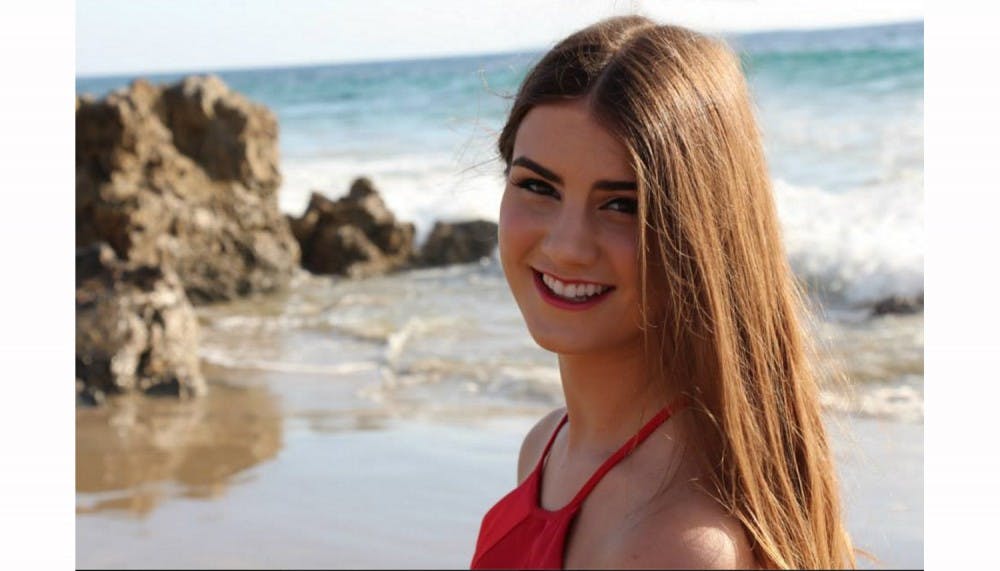Courtney Lang hopes to be an environmental advocate to end the Great Pacific Garbage Patch, ocean acidification, overfishing and pollution. If the fate of this planet lies in the dedicated hands of people like Courtney, we have every reason to be optimistic.
As a California native, Courtney began scuba diving at the age of 11 with her father, who is also an avid diver. She immediately fell in love with the water and became a rescue scuba diver when she turned 13. Courtney and her father go to the Caribbean whenever they get the chance.
Over the years, Courtney took photos of the incredible reefs she encountered to show her mother and sisters who don't dive. In these photos, the devastation of pollution, and the withering reefs astounded her. She reached out, taking the time to talk to people in affected communities about the issues. Inspired, Courtney received her master scuba diving license at the age of 16.
Courtney used the pictures she accumulated to write an informative fantasy children’s novel, You and Me Saving the Sea, aimed at educating kids about environmental problems. The book is geared specifically towards young girls, as the protagonist, a young mermaid, travels through the ocean, slowly realizing the effects of pollution on her home. Courtney brought her published work to several schools in California to encourage kids to think of cool and creative solutions. She fondly shares one boy’s solution for the Great Pacific Garbage Patch: “He suggested we build a fleet of robotic sharks to eat the plastic and scare off the fish who would otherwise fill up with plastic and harm the food chain.”
Courtney’s involvement with Food Crunch, a nonprofit online feeding program that connects people with sustainable ideas in agriculture with funders who have expressed that they would like to invest in such start–ups, exposed her to innovative companies that were making a difference. She ultimately decided to attend Penn and pursue a major in Environmental Studies, concentrating in sustainability and environmental management.
As president of the Earth and Environmental Science Department for Undergraduates, Courtney is heavily involved in her major. She is also involved in the Major Advising program to answer questions and help mentor fellow Penn students. As an Eco Rep for Tri–Delt, she developed sustainable solutions for the chapter house and encouraged people to be more responsible with their energy use.
After her sophomore year, Courtney spent a month interning at the Little Caiman Research Center, where she planted corals cultivated in the reef nursery, worked to clean up marine debris and conducted dissections on a local invasive species, the lionfish. For her senior thesis, she hopes to go to the Bermuda Institute of Ocean Science to dissect their lionfish and statistically compare the results to a previous comprehensive study. “Treating issues like they are the same everywhere is a huge mistake,” she said. “We need to examine the differences between our many ecosystems.”
Courtney opened up about her concern for a climate change–denying president. “We are talking about the misinformation about climate change which is the fault of scientists that don’t communicate properly with the public,” she lamented. “There will be huge impacts, such as sea level rise and extreme weather events. Basically, we have a short window to stop polluting as many green house gases, and we need concrete policy."
She emphasized the need for economic incentives to change the way people power their lives. It can be frustrating when the rest of the world and country doesn’t care as deeply about the issues she holds so dear. There is a stereotype about environmentalists and their activist protesting. Although she respects all forms of action, she prefers a different method. Here at Penn, she hopes to give people a space to talk. “How can we change our generation and the future if we can’t change the opinions those around us currently hold?” she points out.
Although she wishes that people would be more proactive about stopping climate change, Courtney is hopeful for the future, even under the administration of a climate change–denying president. She described how surprised she was to discover that under Ronald Reagan's presidency, activist groups gained the most traction and the strongest follower bases, despite his anti–environmentalist platform. Courtney is hopeful that Trump's presidency might inspire a similar wave of change.

